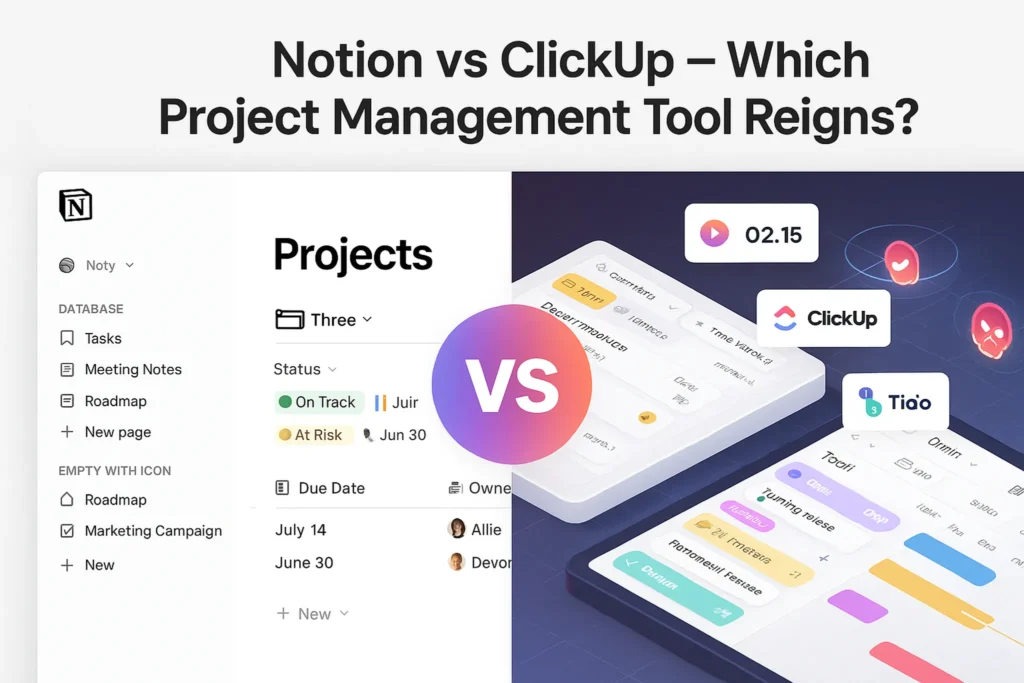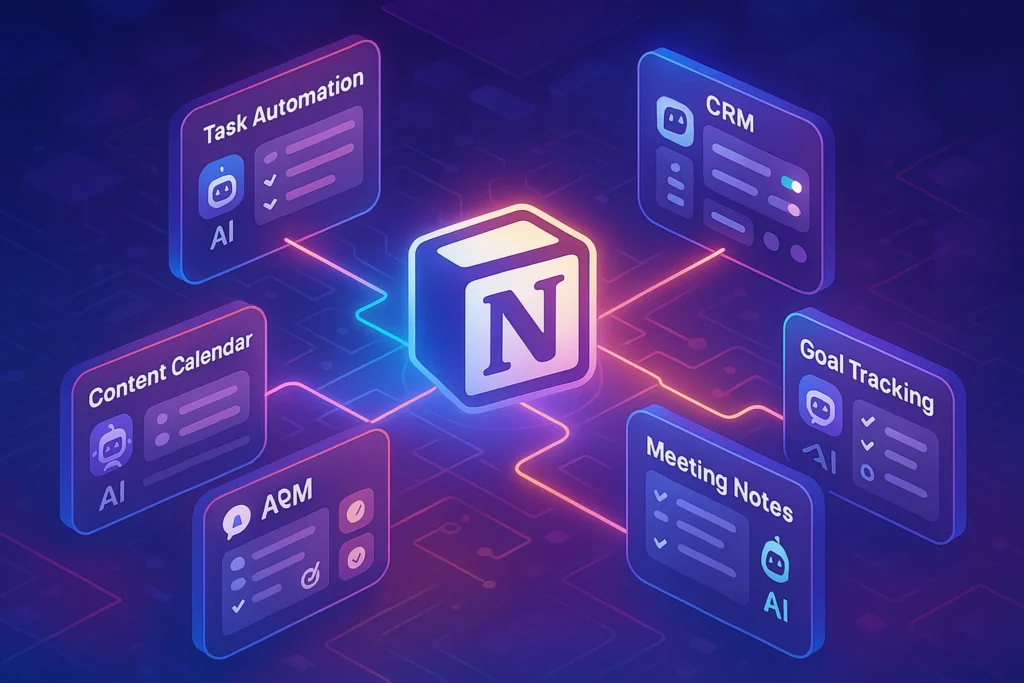-This post may contain affiliate links. If you click on one and make a purchase, I may earn a small commission at no extra cost to you.-
🌍 Introduction
Managing tasks, projects, and collaborating with your team depends heavily on choosing the right tool. Notion and ClickUp are two of the most talked-about platforms—but which one should you pick in 2025?
This post dives deep into:
-
Core differences in philosophy and use cases
-
Real-world workflows and adoption insights from both platforms
-
Side‑by‑side breakdown of pricing, features, customizations, and limitations
-
A final verdict pointing you toward the best choice
Smart repurpose ideas and calls to action with affiliate links for both tools
📌 1. Philosophical Differences: Workspace vs. Work OS
Notion’s core strength lies in its blank canvas approach. You craft your design—whether that’s a task list, knowledge base, CRM, or project hub—using drag‑and‑drop blocks and custom databases. If your work is creative, documentation-heavy, or you love tailoring every detail, Notion is ideal. Its intuitive text editing makes the tool feel more like a digital notebook with structure.
This flexibility also makes Notion a powerful template-selling platform, especially for creators and solopreneurs. If you’re exploring monetization routes, check out our guide on How to Sell Notion Templates Online (Step‑by‑Step Guide) to turn your workspace into a digital product.
🧩 2. Real-World Use Cases
A small marketing team maintains editorial calendars, resource libraries, and campaign trackers using linked databases. They also automate repetitive planning steps using embedded workflows—especially with the help of smart AI templates. Our curated list of 5 AI-Powered Notion Templates to Automate Your Workflow highlights ready-to-use options that save hours weekly.
Notion in Action
-
A solo freelancer uses Notion to combine meeting notes, client tasks, and publishing schedules in one workspace.
-
A small marketing team maintains editorial calendars, resource libraries, and campaign trackers using linked databases.
ClickUp at Scale
-
A 10-person startup uses ClickUp to assign tasks, track progress, set Sprint goals, and run daily standups, all coordinated via calendar views and automations.
-
A mid-size operations team tracks quarterly goals and monthly reports through Dashboards, time tracking, and resource allocation tools.
A Reddit user put it best:
“ClickUp definitely much better for project/task management. Docs have also gotten way better on par with Notion imo.”
💵 3. Pricing Breakdown
Notion Pricing
-
Free: Unlimited personal use, 5 MB file uploads, 10 guest collaborators
-
Plus: $10/user/mo (billed annually) — unlimited blocks, custom domains, automations
-
Business: $20/user/mo — plus advanced permissions, workspace analytics, SAML SSO
-
Enterprise: Custom pricing with audit logs and HIPAA compliance
ClickUp Pricing
-
Free Forever: Unlimited tasks/users, but 100 MB storage and limited advanced features
-
Unlimited: $7/user/mo (annual) — unlimited integrations, Gantt, views, dashboards
-
Business: $12/user/mo — time tracking, workload, portfolio Dashboards
-
Enterprise: Custom, with SSO, white-labeling, and advanced permissions
Key Takeaway: ClickUp’s Unlimited plan offers more feature-for-price value than Notion’s Plus, especially for teams.
⚙️ 4. Feature Face-Off
Notion enables the creation of fully tailored tables, kanban boards, galleries, and wikis. If your workflow thrives in custom setups, Notion gives you the freedom. And with advanced scripting and third-party integrations, you can go even further. Our guide on How to Build Custom Automation Workflows in Notion walks you through building repeatable systems for content calendars, team updates, and client onboarding—all without coding.
Customization & Database Flexibility
Notion enables the creation of fully tailored tables, kanban boards, galleries, and wikis. If your workflow thrives in custom setups, Notion gives you the freedom.
ClickUp offers defined project structures, custom fields, dependencies, and built-in automations—less freedom, more structure.
Views & Task Tracking
ClickUp excels with Gantt charts, workload views, and time tracking.
Notion has calendar/kanban views, but no time tracking or native workload tools without integrations.
Collaboration
Notion supports comments, real-time editing, and inline discussions.
ClickUp adds chat, mentions, task comments, and @‑mention notifications—better for distributed teams needing transparent communication.
AI & Automation
Notion AI assists with summarizations and writing tasks (Business tier).
ClickUp Brain handles tasks summarization, smart recommendations—and deeper automations via paid add-ons.
✅ 5. Pros & Cons
Notion Pros
-
Unlimited free personal usage
-
Fully adaptable workflows
-
Great for documentation
-
Minimalist and distraction-free UI
Notion Cons
-
No offline support
-
Lacks time tracking
-
Setup-intensive for new users
ClickUp Pros
-
Rich feature set: time track, automations, dependencies
-
Offline access and mobile support
-
Strong free tier backed by advanced plans
ClickUp Cons
-
Learning curve can overwhelm new users
-
Some users report performance lag in larger instances
📖 Beyond Features: Choosing Based on Personality & Team Culture
Sometimes, the best tool isn’t about specs or pricing—it’s about how it feels to use. In our deep dives, we often see patterns between tool personality and team culture.
🧑🎨 If Your Team is Creative, Visual, and Flexible…
Notion feels like home. It invites you to build things your way—pages within pages, toggle sections, callouts, databases, and embeds all harmonize beautifully. It’s especially beloved by:
-
Content creators & bloggers
-
Designers & educators
-
Product thinkers who love aesthetic control
For example, if you’re building a digital product library, Notion lets you document every asset, SOP, and tutorial visually. And with our How to Sell Notion Templates Online guide, you can even monetize what you build.
🧑💼 If Your Team is Operational, Deadline-Driven, and Data-Focused…
ClickUp wins hands down. You get measurable workflows, multiple assignees, Gantt charts, and automations that make Agile or Waterfall project management easier. ClickUp often fits:
-
Operations & logistics teams
-
Development squads & startup teams
-
Sales & CRM tracking
You don’t need to reinvent the wheel—ClickUp ships ready-to-go.
🔄 Template Ecosystems: A Hidden Competitive Edge
Both Notion and ClickUp boast active communities—but the types of templates available differ significantly.
Notion’s Template Universe:
-
Over 1M community-built templates exist on platforms like Notion Market, Gumroad, and Reddit.
-
Templates span second-brain setups, journaling, habit tracking, and freelance CRM systems.
-
With AI support layered in, you can now build adaptive templates that write content, update checklists, and prioritize tasks.
See: 5 AI-Powered Notion Templates to Automate Your Workflow for powerful ready-to-go systems.
ClickUp’s Template Ecosystem:
-
ClickUp leans into workflow-based templates: Agile boards, OKRs, product roadmaps, client portals.
-
Templates are typically more structured and best used by teams who want to start managing immediately.
-
ClickUp even includes setup wizards that apply templates with automations and dependencies intact.
🧪 Performance & Reliability: What Long-Term Users Say
While both platforms are cloud-first, users have different experiences with speed, downtime, and performance.
-
ClickUp has faced past criticism for sluggish load times on large workspaces, but performance improvements have rolled out in 2024–2025. Still, users managing 1000s of tasks per project sometimes report delays in views and dashboards.
-
Notion generally loads faster, but performance can degrade when pages contain too many linked databases, formula filters, or nested toggles. Offline support is still minimal—which can be a deal-breaker for frequent travelers or remote users.
📚 Integrations & Workflow Automation
Notion
-
Relies heavily on third-party services (Zapier, Make, Automate.io) for workflow automation.
-
Built-in API is improving, but lacks native triggers for advanced use cases.
-
However, using tools like Tally Forms, Super.so, and NotionForms gives Notion a frontend boost.
Want to build repeatable, smart automations? Don’t miss our tutorial on How to Build Custom Automation Workflows in Notion using no-code tools.
ClickUp
-
Offers native automations (e.g., “When status changes to Done → assign task to Manager”).
-
Native integrations with Slack, Google Calendar, Zoom, HubSpot, and GitHub.
-
API is strong, especially for startups building internal dashboards.
🧠 AI in 2025: Notion AI vs ClickUp Brain
Both platforms now offer AI-powered assistants, but their implementations differ:
Notion AI:
-
Functions more like a writing partner: helps you draft, rewrite, summarize, translate, and generate content.
-
Context-aware within documents—especially great for writers, marketers, and researchers.
ClickUp Brain:
-
Feels more like a productivity agent: suggests next actions, auto-assigns tasks, and surfaces bottlenecks.
-
Great for managers and teams tracking time, scope, and deliverables.
Which AI suits you depends on whether you create a lot of content (→ Notion) or manage a lot of workflow (→ ClickUp).
🚧 Migration Considerations
Switching tools? Here’s what to know:
-
Moving from Notion to ClickUp can feel like giving up freedom for structure. You’ll gain control over tasks but may miss visual freedom.
-
Going from ClickUp to Notion gives you total page freedom—but you may need to manually rebuild some logic (e.g., dependencies).
Recommendation: If you’re switching, start with a pilot project in your new tool before committing workspace-wide.
📦 Use-Case Stack Examples
Stack 1: Creator Workflow
-
✅ Notion: for planning, documentation, and product templates
-
🧠 Plus: Add AI-powered writing & automation
-
📬 Use Gumroad + Notion for monetization (see: How to Sell Notion Templates)
Stack 2: Startup Operations
-
✅ ClickUp: for sprint planning, time tracking, goals
-
🔁 Integrate with Slack, GitHub, GDrive
-
📊 Dashboards for KPI reports
Both stacks serve different DNA types. Choose accordingly.
🧭 Notion vs ClickUp: Quick Comparison Table
| Feature | Notion | ClickUp |
|---|---|---|
| Best For | Flexible documentation workflows, knowledge bases, personal PM | Structured project management, mid-size to enterprise teams |
| Free Plan | Unlimited personal pages/blocks, 5 MB uploads | Unlimited tasks, unlimited users, basic views |
| Entry Price (Annually) | $10/user – Plus | $7/user – Unlimited plan |
| Advanced Features | Custom databases, synced blocks | Time tracking, Gantt, custom fields |
| AI Support | Notion AI (Business tier) | ClickUp Brain add‑on |
| Offline Support | No real offline | Yes, including mobile app |
| Learning Curve | Moderate (requires setup) | Steeper (many features to navigate) |
| Ideal Team Size | Individuals to small teams | Small startups to large teams |
🧠 Nerd Verdict
Notion’s canvas-style, documentation-first approach is a perfect fit for creative solo workers or small teams who want full control. ClickUp, on the other hand, suits fast-growing teams needing structure, collaboration, and built-in execution tools. If you need project tracking, dependencies, and time logging, ClickUp wins. If your work is knowledge-based, Notion may be the smarter choice.
👉 Final Recommendation:
-
Use Notion if your primary goal is organizing information flexibly and customizing your workspace.
-
Choose ClickUp if you need structured, scalable task management with robust teams and automation.
❓ FAQ
Q: Can I switch from Notion to ClickUp (or vice versa)?
A: Yes, both tools offer import/export options and third-party integrations—although setup may require manual tweaking.
Q: Is offline work possible?
A: Only ClickUp supports offline mode across its apps. Notion isn’t reliable without internet
Q: Which tool offers better templates?
A: Notion shines with community-built templates across niches. ClickUp provides more structured, workflow‑focused templates.
Q: Do both integrate with Google Calendar?
A: ClickUp offers native calendar sync. Notion requires third-party integrations or Zapier workarounds .
💬 Would You Bite?
Which tool aligns better with your workflow—and why?
Share your experience below to help others! 👇 Let’s hear from you.



